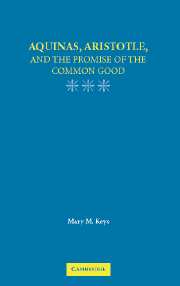Book contents
- Frontmatter
- Contents
- Acknowledgments
- PART I VIRTUE, LAW, AND THE PROBLEM OF THE COMMON GOOD
- PART II AQUINAS'S SOCIAL AND CIVIC FOUNDATIONS
- PART III MORAL VIRTUES AT THE NEXUS OF PERSONAL AND COMMON GOODS
- PART IV POLITICS, HUMAN LAW, AND TRANSPOLITICAL VIRTUE
- 8 Aquinas's Two Pedagogies: Human Law and the Good of Moral Virtue
- 9 Theological Virtue and Thomistic Political Theory
- Works Cited
- Index
8 - Aquinas's Two Pedagogies: Human Law and the Good of Moral Virtue
Published online by Cambridge University Press: 25 July 2009
- Frontmatter
- Contents
- Acknowledgments
- PART I VIRTUE, LAW, AND THE PROBLEM OF THE COMMON GOOD
- PART II AQUINAS'S SOCIAL AND CIVIC FOUNDATIONS
- PART III MORAL VIRTUES AT THE NEXUS OF PERSONAL AND COMMON GOODS
- PART IV POLITICS, HUMAN LAW, AND TRANSPOLITICAL VIRTUE
- 8 Aquinas's Two Pedagogies: Human Law and the Good of Moral Virtue
- 9 Theological Virtue and Thomistic Political Theory
- Works Cited
- Index
Summary
In Part III, I argued that in elaborating his own accounts of two critical Aristotelian moral virtues, magnanimity and legal justice, Aquinas places an increased and more explicit emphasis on the “common” aspect of ethical virtue, with a view to personal internal disposition as well as external conduct. He thus effectively situates moral virtue at the nexus point between personal and common goods and presents moral virtue itself as a common or sharable good, further moderating the classical emphasis on self-sufficiency and superiority. With regard to legal justice, Aquinas lays greater stress than did Aristotle on the common good as the end “informing” this virtue, as he does also in his explication of magnanimity. Moreover, I argued that Aquinas's theory of natural law provides a higher measure, simultaneously divine and human, whereby legal or general justice can be considered both properly legal and universally virtuous, responding to a critical problem in Aristotle's ethics and politics.
For all its universality, Aquinas's theory of legal justice nonetheless holds an important place for politics ordinarily understood, and for participation and practices guided in some respects by civil law and issuing in new ordinances deemed useful for the community. If law and virtue are so closely intertwined in Aquinas's politics of the common good, we might then wonder whether he is not uncomfortably close in theory to the “clear and present danger” posed in practice by the Vice and Virtue Ministry mentioned in Chapter 1.
- Type
- Chapter
- Information
- Aquinas, Aristotle, and the Promise of the Common Good , pp. 203 - 225Publisher: Cambridge University PressPrint publication year: 2006



